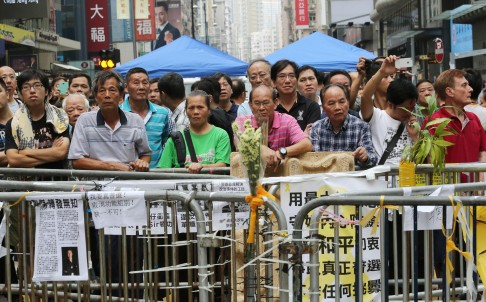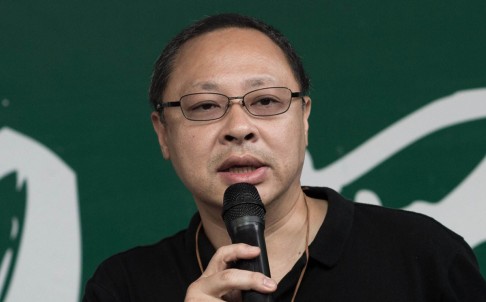
Occupy Central
Occupy Central is a civil disobedience movement which began in Hong Kong on September 28, 2014. It calls on thousands of protesters to block roads and paralyse Hong Kong's financial district if the Beijing and Hong Kong governments do not agree to implement universal suffrage for the chief executive election in 2017 and the Legislative Council elections in 2020 according to "international standards." The movement was initiated by Benny Tai Yiu-ting (戴耀廷), an associate professor of law at the University of Hong Kong, in January 2013.
OCCUPY CENTRAL - DAY 56: Full coverage of the day’s events
Protester loses bid to appeal against injunction allowing police to aid bailiffs
Despite 'exceptional political circumstances', judges reject attempt to halt ruling authorising bailiffs and police to clear Mong Kok site
PUBLISHED : Saturday, 22 November, 2014, 4:36am
Judges said citizens' rights needed protection. Photo: Felix Wong
Courts have the duty to protect the constitutional rights of private citizens, two appeal judges have ruled in upholding an injunction order that authorised bailiffs and the police to help clear the protest area in Mong Kok.
High Court Chief Judge Mr Justice Andrew Cheung Kui-nung and Court of Appeal vice-president Mr Justice Johnson Lam Man-hon made the observation as they refused a protester leave to appeal against the order.
"We understand there are exceptional political circumstances that gave rise to the unlawful occupation in the present case," Mr Justice Lam wrote. "But the court has to be involved in this instance because the rights of private citizens protected by the law are said to be threatened and they seek redress."
Protester Ng Ting-pong, in seeking leave to appeal and a stay of the order, had asked why the matter should be dealt with by civil litigation rather than an action brought by the secretary for justice.
Lam said the minibus drivers group who obtained the injunction claiming their business had suffered from the obstruction of Argyle Street had simply exercised their constitutional right.
"It is the duty of the court to adjudicate upon and, where justified, give effect to such rights according to law," Lam wrote.
"Even in cases where protesters are pursuing a noble cause that they feel strongly about (and we express no view on the protest in the case before us), this does not give them any right in the eyes of law to trample upon the rights of the others who may or may not agree with their cause.
"This is an important facet of the rule of law which, as judges, we must uphold."
Lam also stated that the court would not consider similar future applications for leave to appeal.
He said that the case involved exceptional circumstances because a large number of protesters, with the encouragement of some public figures, had openly disobeyed and flouted the injunction order.
"If such an idea prevails, it will bring society into disorder, chaos and lawlessness," he wrote.
The two appeal court judges backed Mr Justice Thomas Au Hing-cheung's decision to allow the police to assist bailiffs if necessary.
They found that Au's order, issued on November 10, did not compel the police to make any arrest but limited their action to powers conferred on them by the law. They also found that Au had given clear directions to the bailiffs and the police on how to carry out the order. They believed that protection had been given to the defendants.
The minibus group's lawyer, Maggie Chan Man-ki, said they would take clearance action as early as Monday but that no timetable had been fixed.
Ng was disappointed with the judgment. He said some protesters would stay until they were arrested and that it would not be the end of their campaign.
Meanwhile, six men arrested in connection with an attempt to break into the Legislative Council building on Wednesday were granted bail yesterday.
The six defendants - aged between 18 and 24, who face charges including criminal damage and assaulting police officers - were ordered by Principal Magistrate Bina Chainrai in Eastern Court not to go within 300 metres of the Legislative Council building.
They did not enter a plea and the case was adjourned until January 19.
Yesterday, another man - described in media reports as a member of the radical group Civic Passion - was arrested at Ngau Tau Kok, putting the total number of people arrested for Wednesday's clash at 11.
The man was arrested on suspicion of criminal damage.
This article appeared in the South China Morning Post print edition as Protester loses bid to stay injunction
Naive students are pursuing unrealistic political objectives
PUBLISHED : Saturday, 22 November, 2014, 5:15am
Benny Tai is encouraging the naive youth to break the law in order to achieve unrealistic political objectives.
The Occupy Central movement has attracted thousands of participants from a broad diversity of backgrounds, life experiences and political philosophies.
Many of the participants are students who share the same mentality.
Amongst Chinese students lies the erroneous but deeply ingrained belief that one must work hard and attend the top university to become successful in life.
I have witnessed the chaos at an Occupy protest area. A middle-aged anti-Occupy activist was annoyed by the inconvenience.
He was shouting at students and protesters for making his business suffer.
A student went up to the man and disparaged his background, asking if he only obtained education up to primary level and if he even knew English.
A well-educated student should be sensitive and realise that it is hard to make a living in Hong Kong even if you are educated and that you should know not to lose respect for your elders at all times.
A harmful consequence of Occupy Central is clearly that it has indeed created a general divide between the opinions of the old and the young.
One of Occupy Central's founders, Benny Tai Yiu-ting, has repeatedly claimed that persistence will lead to a change in the city's political system and bring about a "new" Hong Kong, an idea I find quite threatening.
The vision he has described is what students hope to achieve, but it is impossible.
He is encouraging the naive youth to break the law in order to achieve unrealistic political objectives.
He is an associate professor and as such he should know when he is stepping outside of his responsibilities and should stop.
A professor belongs in the library and the lecture theatre. His responsibility is to nurture talent, not to take it on to the streets in defiance of the law at the risk of ruining the future prospects of students. They are not being paid by taxpayers to lobby in the streets, which is the role of politicians. Any activism in politics by a professor is therefore unacceptable.
Although I was very disobedient when young, I was not manipulated by anyone and gradually worked my way towards becoming a lawyer.
Life is unpredictable and students should accept the reality that Hong Kong can never be perfect.
Barry Chin, Central
This article appeared in the South China Morning Post print edition as Naive students are pursuing unrealistic political objectives


沒有留言:
張貼留言